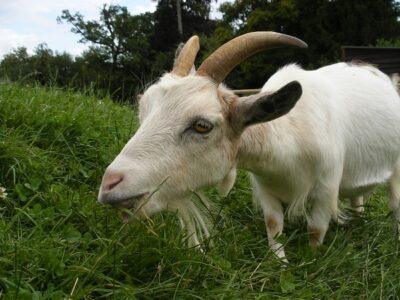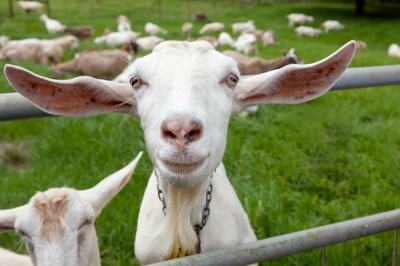I’m sure many of us remember hearing at one time or another that a goat will eat just about anything. A fellow I once knew told me you can never trust a goat around farm equipment because they will eat the tires.
At the time, I had no experience with the horned garbage disposals, and so I bought it lock, stock and barrel. I’m sure I’m not the only one.
Until I took a job on a friend’s farm years ago after graduating high school, the only experience I had with a goat was a neighbor’s expensive European breed that did nothing but stink and spit at me. Needless to say, goats had a long way to go to endear themselves to me. I had always liked pastured hogs better. And the idea of raising animals that would eat the stuffing out of my tractor seat or the antenna off my car was anything but appealing.
I had it all wrong. I have never seen a goat eat anything beyond grasses, shrubs, vegetables, some odd plants here and there and feed pellets. Yes, the John Deere and Farmall still have their tires.
Today, I recommend goats to anyone looking for a relatively low-maintenance animal to raise for meat or milk. They are much easier than cattle and provide much more meat than a chicken.
Getting Started
Before you commit to raising a new animal, do your homework and be sure this is something that is feasible for you and your family. Goats do much better on pasture than they will in a pen, so you should have some acreage available. Also, decide what you want to raise – meat goats or milk breeds. With a meat goat, you can get away with entirely raising them on pasture. On the other hand, you likely will have to supplement a dairy goat (at least in my experience) to get an excellent-quality milk and high production amount. Most homesteaders raise goats for meat, so that is what I will focus on here.
This Book Clearly Illustrates What An Easy And Rewarding Experience Raising Goats Can Be.
Typically, breeds of goats are not expensive. You can even once in a while get a few for free. Since there are more breeds out there than rocks on a country road, I encourage you to research what breed would be best for you and your farm or homestead.
Fences and Pasture

Image source: Flickr
Goats, like most farm animals, require fencing. They may not eat the paint off a combine, but they sure will eat up your vegetable garden. Fencing also will help protect them. The most common predator you will have to deal with is Mr. Wile E. Coyote. Dogs help, as does keeping the coyote population in check. For that I recommend Mr. Two-Two-Three (if you don’t follow, a .223 rifle).
Goats do very well on pasture. I have found you can raise them right alongside your pastured pigs and free-ranged (or chicken tractored) poultry. Goats tend to keep weeds and shrubs in check that other animals won’t eat.
Feed, Shelter, Water
If you are raising a goat strictly for meat, you can fully pasture them and get away with little to no supplemental feed. In the winter, be prepared to supplement as necessary in colder climates. Hay rich in alfalfa is a good option. While on pasture, rotational grazing should be a standard practice on any lot over an acre in size. Moving the goats to another area of pasture every few days is important if you want to avoid damaging your land and top soil due to overgrazing. Also, be sure to give your goats plenty of access to water and shade in the summer heat and shelter in winter.
Breeding
Breeding your goats for continuous meat production is quite simple and nowhere near as stressful as cattle calving season. Selecting does (females) and buck (males) for breeding is an important task. Only the bucks with the best features should be used for breeding. The rest of any male kids should be castrated to improve meat quality. Castration usually takes place a few days after birth.
Want The Best Chemical-Free, All-Natural Insecticide — For Your Garden AND Home?
Now, I know not everyone castrates buck kids, but if you want improved meat quality I recommend it. Breeder bucks tend to have a very musky smell and I have found it to impact the meat flavor.
After a buck has mated a doe, gestation is around 150 days. The doe will usually give birth to twins and I have seen several triplets dropped as well. Goats are hardy critters and usually do not need any special attention during birth. If they share a pasture with pigs, it is prudent to separate the goats and hogs until the newborn kids are at least a week old.
I have just scratched the surface when it comes to raising goats. I am sure that you will find that raising meat goats on pasture is almost as easy as pastured pork. Goat meat is lean, high in protein and when cooked properly it is incredibly delicious. If you haven’t thought of adding goats, I encourage you to do so!
(Also read: 7 reasons your homestead needs goats – not cows.)
What goat-raising tips would you add? Share them in the section below:
 Off The Grid News Better Ideas For Off The Grid Living
Off The Grid News Better Ideas For Off The Grid Living





